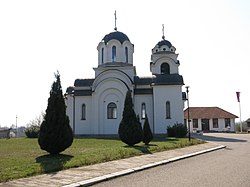
Bosnia and Herzegovina, abbreviated BiH or B&H, sometimes called Bosnia–Herzegovina and often known informally as Bosnia, is a country at the crossroads of south and southeast Europe, located in the Balkans. The capital and largest city is Sarajevo. Bosnia and Herzegovina borders Serbia to the east, Montenegro to the southeast, and Croatia to the north and southwest. It is not entirely landlocked; in the south it has a narrow coast on the Adriatic Sea within the Mediterranean, which is about 20 kilometres long and surrounds the town of Neum. Bosnia, which is the inland region of the country, has a moderate continental climate with hot summers and cold, snowy winters. In the central and eastern regions of the country, the geography is mountainous, in the northwest it is moderately hilly, and in the northeast it is predominantly flat. Herzegovina, which is the smaller, southern region of the country, has a Mediterranean climate and is mostly mountainous.
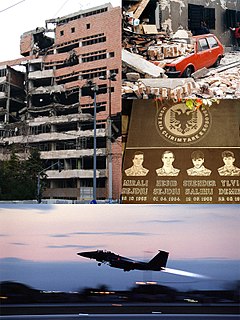
The Kosovo War was an armed conflict in Kosovo that started 28 February 1998 and lasted until 11 June 1999. It was fought by the forces of the Federal Republic of Yugoslavia, which controlled Kosovo before the war, and the Kosovo Albanian rebel group known as the Kosovo Liberation Army (KLA). The conflict ended when the North Atlantic Treaty Organization (NATO) intervened by beginning air strikes in March 1999 which resulted in Yugoslav forces withdrawing from Kosovo.

Kosovo, officially the Republic of Kosovo, is a partially recognised de facto sovereign state in Southeast Europe. It lies at the centre of the Balkans, occupying an area of 10,887 km2 (4,203 sq mi), with a population of about 1.8 million; it is bordered by Serbia to the north and east, North Macedonia to the southeast, Albania to the southwest, and Montenegro to the west. Most of central Kosovo is dominated by the vast plains and fields of Metohija and Kosovo. The Accursed Mountains and Šar Mountains rise in the southwest and southeast, respectively. Its capital and largest city is Pristina.

Serbia and Montenegro, officially known as the State Union of Serbia and Montenegro was a country in Southeast Europe located in the Balkans that existed from 1992 to 2003, following the breakup of the Socialist Federal Republic of Yugoslavia which bordered Hungary to the north, Romania to the northeast, Bulgaria to the southeast, FYRO Macedonia to the south, Croatia and Bosnia and Herzegovina to the west, and Albania to the southwest. The state was founded on 27 April 1992 as the Federal Republic of Yugoslavia, known as FR Yugoslavia or simply Yugoslavia which comprised the Republic of Serbia and the Republic of Montenegro. In February 2003, FR Yugoslavia was transformed from a federal republic to a political union until Montenegro seceded from the union in 2006, leading to the full independence of both Serbia and Montenegro.

Serbia, officially the Republic of Serbia, is a landlocked country in Southeast Europe, at the crossroads of the Pannonian Plain and the Balkans, bordering Hungary to the north, Romania to the northeast, Bulgaria to the southeast, North Macedonia to the south, Croatia and Bosnia and Herzegovina to the west, and Montenegro to the southwest, and claiming a border with Albania through the disputed territory of Kosovo. Serbia has a population of almost 7 million, with Belgrade as its capital and largest city.

Yugoslavia was a country in Southeast Europe and Central Europe for most of the 20th century. It came into existence after World War I in 1918 under the name of the Kingdom of Serbs, Croats and Slovenes by the merger of the provisional State of Slovenes, Croats and Serbs with the Kingdom of Serbia, and constituted the first union of the South Slavic people as a sovereign state, following centuries in which the region had been part of the Ottoman Empire and Austria-Hungary. Peter I of Serbia was its first sovereign. The kingdom gained international recognition on 13 July 1922 at the Conference of Ambassadors in Paris. The official name of the state was changed to Kingdom of Yugoslavia on 3 October 1929.
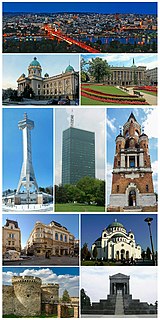
Belgrade is the capital and largest city of Serbia. It is located at the confluence of the Sava and Danube rivers and the crossroads of the Pannonian Plain and the Balkan Peninsula. Nearly 1.7 million people live within the administrative limits of the City of Belgrade.

Serbs are a South Slavic ethnic group and nation, native to the Balkans in Southeastern Europe.

Serbian is the standardized variety of the Serbo-Croatian language mainly used by Serbs. It is the official and national language of Serbia, one of the three official languages of Bosnia and Herzegovina and co-official in Montenegro and Kosovo. It is a recognized minority language in Croatia, North Macedonia, Romania, Hungary, Slovakia, and the Czech Republic.

The Kingdom of Yugoslavia was a state in Southeast and Central Europe that existed from 1918 until 1941. From 1918 to 1929, it was officially called the Kingdom of Serbs, Croats and Slovenes, but the term "Yugoslavia" was its colloquial name due to its origins. The official name of the state was changed to "Kingdom of Yugoslavia" by King Alexander I on 3 October 1929.

The Socialist Federal Republic of Yugoslavia, commonly referred to as SFR Yugoslavia or simply Yugoslavia, was a socialist country in Southeast and Central Europe that existed from its foundation in the aftermath of World War II until its dissolution in 1992 amid the Yugoslav Wars. Covering an area of 255,804 km2, the SFRY bordered the Adriatic Sea and Italy to the west, Austria and Hungary to the north, Bulgaria and Romania to the east, and Albania and Greece to the south. It was a one-party socialist state and federation governed by the League of Communists of Yugoslavia and made up of six socialist republics—Bosnia and Herzegovina, Croatia, Macedonia, Montenegro, Serbia, and Slovenia—with Belgrade as its capital; it also included two autonomous provinces within Serbia: Kosovo and Vojvodina.

Republika Srpska is one of the two entities of Bosnia and Herzegovina, the other being the Federation of Bosnia and Herzegovina. It is located in the north and east of the country. Its largest city and administrative centre is Banja Luka, lying on the Vrbas river.
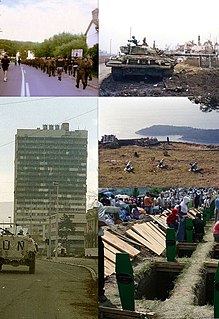
The Yugoslav Wars were a series of separate but related ethnic conflicts, wars of independence, and insurgencies fought in the former Yugoslavia from 1991 to 2001, leading up to and resulting from the breakup of the Yugoslav federation in 1992. Its constituent republics declared independence due to unresolved tensions between ethnic minorities in the new countries, which fueled the wars.
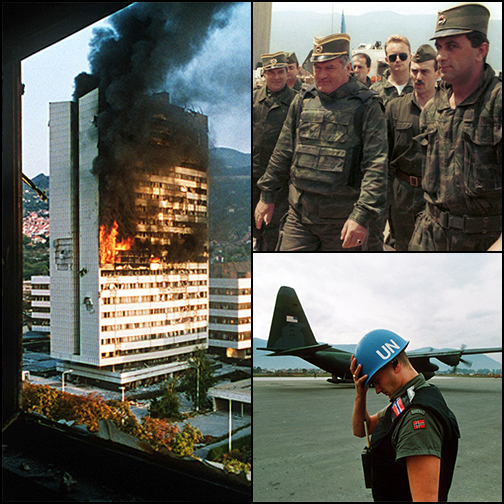
The Bosnian War was an international armed conflict that took place in Bosnia and Herzegovina between 1992 and 1995. The war is commonly seen as having started on 6 April 1992, following a number of earlier violent incidents. The war ended on 14 December 1995. The main belligerents were the forces of the Republic of Bosnia and Herzegovina and those of Herzeg-Bosnia and Republika Srpska, proto-states led and supplied by Croatia and Serbia, respectively.
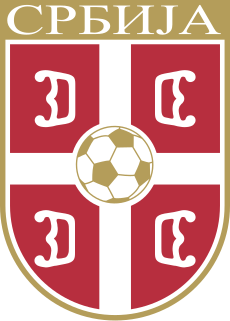
The Serbia national football team represents Serbia in men's international football competition. It is controlled by the Football Association of Serbia, the governing body for football in Serbia.

The breakup of Yugoslavia occurred as a result of a series of political upheavals and conflicts during the early 1990s. After a period of political and economic crisis in the 1980s, constituent republics of the Socialist Federal Republic of Yugoslavia split apart, but the unresolved issues caused bitter inter-ethnic Yugoslav wars. The wars primarily affected Bosnia and Herzegovina, neighbouring parts of Croatia and, some years later, Kosovo.
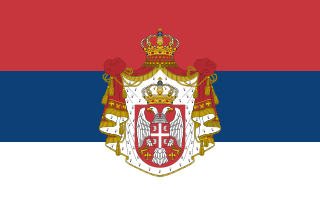
The Kingdom of Serbia was a country located in the Balkans which was created when the ruler of the Principality of Serbia, Milan I, was proclaimed king in 1882. Since 1817, the Principality was ruled by the Obrenović dynasty. The Principality, under the suzerainty of the Ottoman Empire, de facto achieved full independence when the last Ottoman troops left Belgrade in 1867. The Congress of Berlin in 1878 recognized the formal independence of the Principality of Serbia, and in its composition Nišava, Pirot, Toplica and Vranje districts entered the South part of Serbia.

Archduke Franz Ferdinand of Austria, heir presumptive to the Austro-Hungarian throne, and his wife, Sophie, Duchess of Hohenberg, were assassinated on 28 June 1914 by Bosnian Serb student Gavrilo Princip, shot at close range while being driven through Sarajevo, the provincial capital of Bosnia-Herzegovina, formally annexed by Austria-Hungary in 1908.
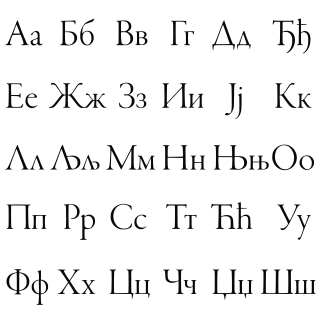
The Serbian Cyrillic alphabet is a variation of the Cyrillic script used to write the Serbian language, updated in 1818 by Serbian linguist Vuk Karadžić. It is one of the two alphabets used to write standard modern Serbian, the other being Gaj's Latin alphabet.

Slobodan Milošević was a Yugoslav and Serbian politician who served as the president of Serbia within Yugoslavia from 1989 to 1997 and president of the Federal Republic of Yugoslavia from 1997 to 2000. He led the Socialist Party of Serbia from its foundation in 1990 and rose to power as Serbian president during efforts to reform the 1974 Constitution of Yugoslavia in response to alleged marginalization of Serbia, views that Serbia's autonomous provinces had too much power, making them almost independent from Serbia, and claims of political incapacity to deter Albanian separatist unrest in Serbia's autonomous province of Kosovo.
